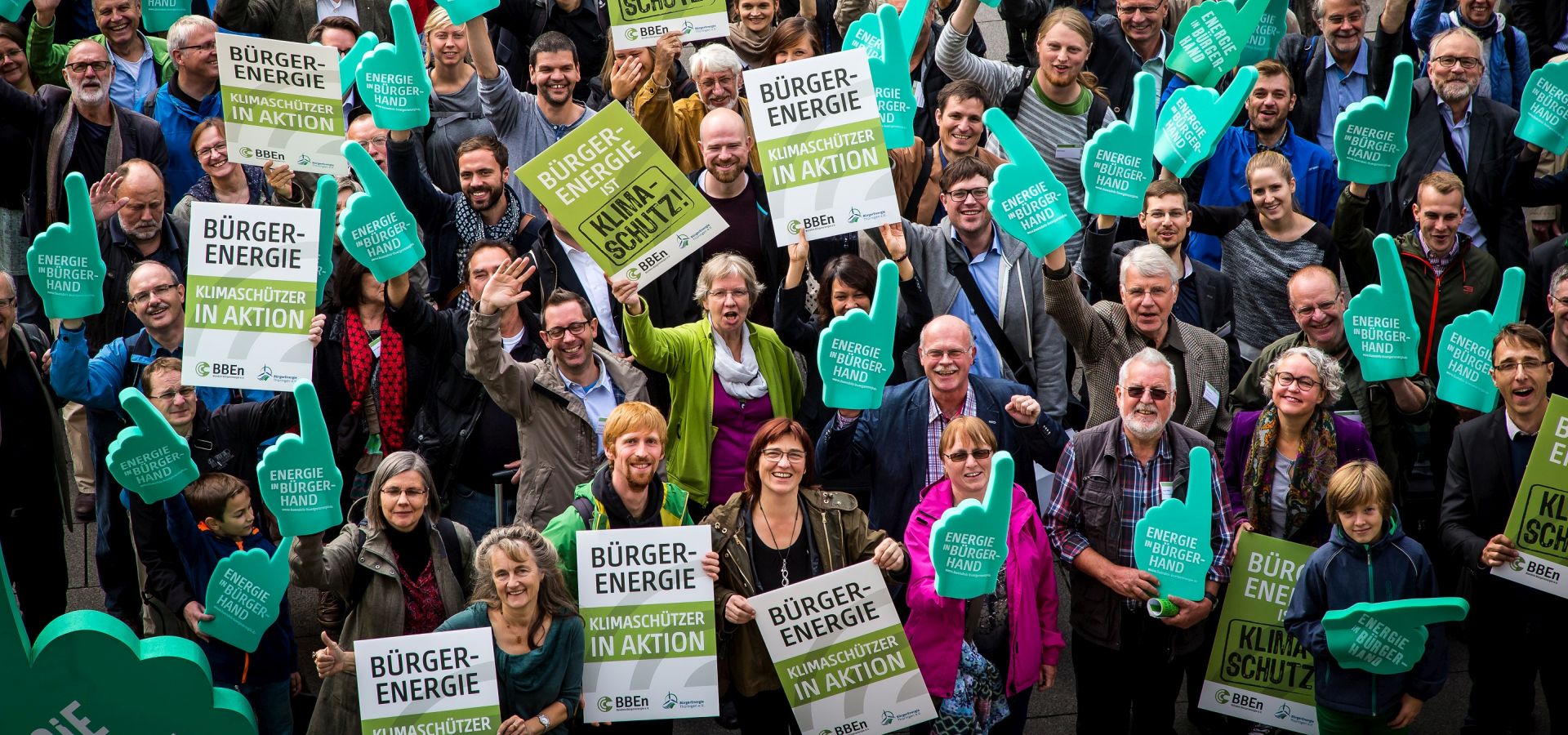In Carbon Democracy, Timothy Mitchell describes how people’s ability to sabotage the economic system strengthened democracy. Craig Morris wonders what the future holds – and if the year 2050 might be cleaner, but also less democratic.

Citizen energy – made possible by renewables – is coming under attack. (Source: Bündnis Bürgerenergie e.V., Jörg Farys)
This is part four of a series on democracy and energy; read parts one, two and three.
To review, one of Mitchell’s main tenets is that democracy is not a state of mind, but an ability. If a county has a (strong) democracy, it’s not because the people there are democratically minded, but rather that they have ways of making politicians and business leaders listen. Thus, the coal sector originally strengthened democracy: “The democratic militancy of coal miners could be traced in part to the autonomy that minors exercised at the coal face.”
But now, coal mining is increasingly mechanized, so Mitchell’s statement no longer holds true for the future: the coal sector will not be a place where citizens can sabotage the economy if fewer people work there.
As Mitchell explains, the oil sector was used to weaken the influence of workers. (He doesn’t discuss nuclear, but relatively few people work in the sector, and nuclear plants are likely to be dismantled faster than they are added in coming decades anyway.)
What about renewables? Mitchell doesn’t say, but his take on economics tells us what to look for.
Mitchell points out that our current definition of the “economy” dates back no earlier than the 1930s. Before that, “economy” meant the prudent management of resources for the good of the populace – not private-sector exploitation of those resources under “market rules.” Around that time, democratic decisions started becoming subject to these rules.
Economists had previously been moral philosophers, but they now became statisticians as math entered the foreground of economics. (But the moral aspect never left: “Modern mathematical statistics… was developed for the purpose of the eugenics movement,” Mitchell reminds us.)
As modern economics developed, the question was how to count flows in the economy: “One side wanted economics to start from natural resources and flows of energy, the other to organize the discipline around the study of prices and flows of money. The battle was won by the second group.” We simply did not have a good estimate of the natural resources available (a problem that still plagues us today), so economists counted something easier to measure: money changing hands.
The purpose was to measure Germany’s ability to repay its debt from World War I (and more generally, a country’s potential tax base so governments could estimate tax revenue). The goal of policymakers should be to increase happiness and well-being, not simply cause people to enter into financial transactions, so we now conflate economic growth (counted in this way) with societal improvements.
Because we now only count money circulating, the limits to growth seem less clear than they did in the days when wealth was based on physical processes. Nowadays, pollution leads to “growth” because clean-ups and medical care cause money to change hands: “The increased expenditure required to deal with the damage caused by fossil fuels appeared as an addition rather than an impediment to growth.” Disappearing resources were never subtracted; in fact, nothing is. Economists can only add, not subtract, as Herman Daly often complains (PDF). Economists explain growth beyond previously perceived physical limits by attributing the progress to technology, but Mitchell argues they fail to subtract the reduction of natural capital.
Simultaneously, mathematical (as opposed to moral) economics started off as a pushback against popular will. Neoliberalism dating back to Friedrich Hayek began as an “alternative project to defeat… populist democracy.” In August 1938, Hayek and others met at a colloquium in Paris “to discuss the work of Walter Lippman criticizing the New Deal.” Lippmann had written about “the dangers of public opinion and the need to expand the areas of concern that are reserved to the decisions of experts.” The “economy” thus became a “new mode of governing democracies… whose experts began to displace democratic debate and whose mechanisms set limits to egalitarian demands.”
These are the rules we now live under; renewables do not change that. But they might bring about an awareness, as people realize they can now make their own energy, that people are citizens first, consumers second. Ownership matters, and energy supply no longer needs to come only from current providers.
Incumbent firms will not take this competition from customers sitting down, which is why they are lobbying against rooftop residential solar in the US; the market could shrink this year. Mitchell’s question from his concluding chapter is thus prescient: “To what powers do we want to subject ourselves?” Or, as we put it in our book, if the energy transition succeeds: “The year 2050 might be cleaner, but also less democratic.”
Craig Morris (@PPchef) is the lead author of Global Energy Transition. He is co-author of Energy Democracy, the first history of Germany’s Energiewende, and is currently Senior Fellow at the IASS.
The classical economists like David Ricardo pretty clearly had an income-and-expenditure model of the economy. The finite resource they were interested in was productive land, and they were clearer-headed on its importance than their modern successors. They and their successors neglected extractible resources, and were basically right to do so. We are never going to run out of coal, oil, iron ore, lithium or what have you. The constraint on the use of material resources is not the availability of minerals or the energy to process them, but the carrying capacity of the biosphere. That’s why we have to stop burning fossil fuels.